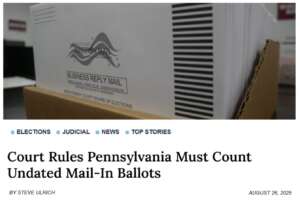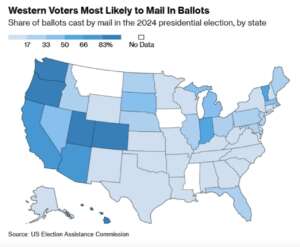Our longstanding worries about ballot fraud with mail-in votes were heightened this week, when a federal appeals court ruled on Tuesday that a Pennsylvania requirement for mail-in ballots with missing or incorrect dates to be tossed out is unconstitutional. The court, in our opinion, ruled ridiculously that the state’s date requirement for mail-in ballots violated the Civil Rights Act, along with the First and 14th Amendments.
“The date on a mail ballot envelope thus has no bearing on a voter’s qualifications and serves no purpose other than to erect barriers to qualified voters exercising their fundamental constitutional right to vote,” a group led by Democratic superlawyer Marc Elias argued.
The federal appeals court didn’t agree with that argument, saying the date requirement imposed a “minimal burden on Pennsylvanians’ right to vote,” and that the requirement is “non-discriminatory.” But the court nonetheless found that none of the state’s reasons for the rule “justified the burden the date requirement imposed.”
The court’s ruling is extremely concerning. Last year, mail-in ballots threatened to overturn the victory of Republican Dave McCormick in Pennsylvania’s crucial US Senate election. The Bucks County Board of Elections voted 2-1 along party lines to accept hundreds of ballots that were either undated or lacked a proper date. Several other counties almost followed its lead, until a public uproar forced them to stand down.
Some 30% of votes cast in the 2024 presidential election were mail-in ballots. States such as California, Oregon, Washington and Colorado conduct their elections entirely by mail. Mail-in ballot rules are consistently being relaxed with states such as New Jersey, California and Nevada now automatically mailing ballots to every registered voter on their notoriously error-prone and inaccurate rolls.
We should be tightening the rules for mail-in-ballots to ensure fair and safe elections. The courts are relaxing them in ways that invite fraud.


